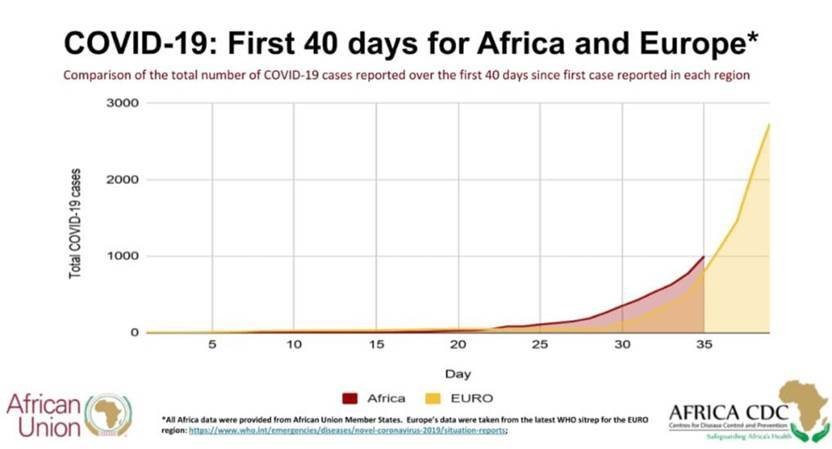Africa has a COVID-19 time bomb to defuse

Coronavirus is a looming threat to Africa’s population of more than 1.2 billion. Image: REUTERS/Siphiwe Sibeko

Explore and monitor how COVID-19 is affecting economies, industries and global issues

Get involved with our crowdsourced digital platform to deliver impact at scale
Stay up to date:
COVID-19
- Africa’s healthcare systems will be overwhelmed when coronavirus cases escalate.
- Africa has little hope of support when countries like the US cannot supply its healthcare workers with personal protective equipment.
In Liberia, the first case of COVID-19 came from someone who brought the disease from Switzerland. This traveller’s household cook was the next in Liberia to test positive for the infection.
This is not the way it is supposed to work. According to the stereotypes, it is the working class in the slums of a non-industrialized country – in this story, that would be the cook – who transfers the infection to the traveller, who then brings the contagion to the industrialized nation. But we do not live in stereotypical times.
Think back to the Ebola outbreak in West Africa a few years back. Seven out of the 28,646 suspected cases escaped the African continent in three and a half years and yet the industrialized world was in a full-scale panic.
Today, it is the industrialized world that is exporting an infectious disease to the global south. While not as deadly as Ebola, COVID-19 is far more contagious.
Africa, with its long underfunded healthcare systems, is a time bomb just waiting to explode. The first few dozens of COVID-19 infections were detected in March, but the virus probably arrived weeks or months before.
In Africa, deaths from COVID-19 might far exceed what the world is witnessing right now unless major steps are taken. But we have little hope for substantial financial support when countries like the US cannot afford to properly supply its healthcare workers with personal protective equipment (PPE).

In hearing stories of workers trying to make their own visors and re-using surgical masks, I think back to the Ebola outbreak when we in Liberia were compelled to do the same. The lack of PPE had a catastrophic effect: 192 health workers died in Liberia from Ebola and related causes.
And yet, with a virus this dangerous, the international community should invest in all countries needing help, from the US to Liberia to anywhere else, because to do otherwise would allow this infection to continue its virulent march around the world.
Sub-Saharan Africa is disproportionally affected by communicable diseases such as HIV/AIDS, malaria and tuberculosis. Non-communicable diseases such as heart attacks and cancer are on the rise, coupled with frequent outbreaks of diseases such as Ebola, measles, meningitis, and monkeypox. Health systems are severely challenged: they have unreliable stocks of essential medicines; little to no electricity; high medical fees for patients; and poor access to health facilities. We have some of the worst child and maternal morbidity and mortality rates on the planet.
What is the World Economic Forum doing about the coronavirus outbreak?
There isn’t much in Africa standing in the way of COVID-19. It is one of the fastest-moving and hardest-hitting pandemics in human history. This is a looming threat to the over 1.2 billion people on the continent of Africa. The high-income countries that bear much of the healthcare costs in Africa are confronted with the COVID-19 fight themselves.
To be honest, unless we obtain more support, we may never know the true impact of COVID-19. Liberia’s healthcare system was able to identify these first two cases and track down their contacts – as a top-line system should. Many other African countries are also ahead of the curve, thanks to our experiences with Ebola.
But once the cases escalate, even the best of systems will be overwhelmed. And this pandemic will never end if we cannot root out all of the infections it causes, even in the poorest of countries. As we see with other infectious diseases like tuberculosis, once they find a home in the slums and other impoverished places around the world, infections will always escape out and threaten the wealthier regions.
The Ebola epidemic that raged through West Africa was an existential threat to Guinea, Liberia and Sierra Leone. A challenge to governments around the world, it severely threatened international public health systems in ways they have never been challenged before.
And yet, even as the first few months of COVID-19 has hit harder than Ebola, there is one lesson learned that many of us will never forget.
We are all on this planet together. You may not be able to wall off diseases like COVID-19 and Ebola, but you also cannot wall off the common bonds of humanity that all of us share. If we are to get through this pandemic – and we will, because humans are a stubborn species – we will get through it together, by providing support to the more impoverished parts of the world. This chapter of our history does not have to end so darkly.
Don't miss any update on this topic
Create a free account and access your personalized content collection with our latest publications and analyses.
License and Republishing
World Economic Forum articles may be republished in accordance with the Creative Commons Attribution-NonCommercial-NoDerivatives 4.0 International Public License, and in accordance with our Terms of Use.
The views expressed in this article are those of the author alone and not the World Economic Forum.
Related topics:
The Agenda Weekly
A weekly update of the most important issues driving the global agenda
You can unsubscribe at any time using the link in our emails. For more details, review our privacy policy.
More on COVID-19See all
Charlotte Edmond
January 8, 2024
Charlotte Edmond
October 11, 2023
Douglas Broom
August 8, 2023
Simon Nicholas Williams
May 9, 2023
Philip Clarke, Jack Pollard and Mara Violato
April 17, 2023





